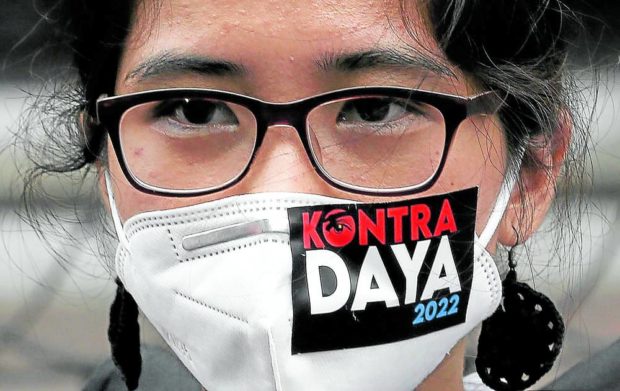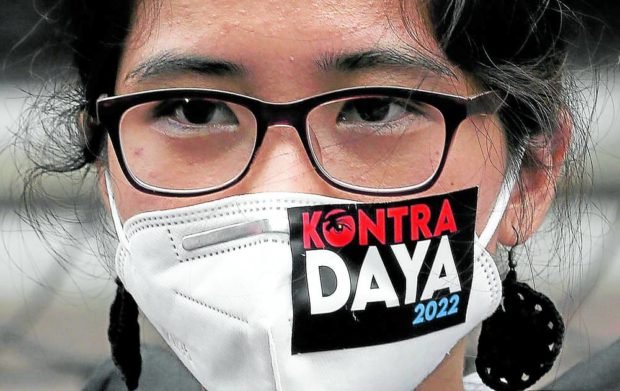
RICHARD A. REYES/INQUIRER FILE PHOTO
MANILA, Philippines — Poll watchdog Kontra Daya has called on the Commission on Elections (Comelec) to act urgently on alleged irregularities during the first week of overseas absentee voting (OAV), including alleged preshaded ballots, which have put a cloud over the integrity of the polls abroad.
“The Comelec should take these reports seriously and not just rely on the blanket denial of certain officials abroad,” Kontra Daya convenor Danilo Arao told the Inquirer on Saturday.
After initially dismissing the reports about preshaded ballots, Comelec Commissioner George Garcia last week said that he would raise the issue with the entire commission and ask for an investigation of the alleged irregularities. Arao said that while the planned investigation was “welcome news” its findings should be made public.
There were 1,697,215 overseas absentee voters registered this year.
“In tightly contested races, overseas votes may be swing votes in the sense that there are roughly 1.6 million votes. The VP race in 2016 was tight and there remains a possibility of a tighter race at various levels,” Arao said.The first week of absentee voting abroad was marred by delays, long queues, and lack of election materials.
The Philippine Embassy in Timor Leste and Syria have not received their official ballots as of Saturday, according to the Department of Foreign Affairs.
It said the consulate in Shanghai, China, was unable to release the shipment from Comelec due to the COVID-19 lockdown.
Embassy confirmation
The most jolting reports, which circulated on social media, said a preshaded ballot was handed to a voter in Dubai and to another in Singapore.
The Philippine Consulate General in Dubai strongly denied the report and advised Filipinos against posting “unverified and/or unsubstantiated allegations” on social media.
“No such incident or anything remotely similar occurred or was reported,” it said in a statement.
It said poll watchers from at least five political parties who witnessed the first day of voting reported no irregularity.
The Philippine Embassy in Singapore confirmed the report and said it was a mistake.
On Saturday, former Comelec Chair Andres Bautista tweeted in defense of Cheryl Abundo, the Singapore-based voter whose viral Facebook post regarding the preshaded ballots was criticized and brushed off by netizens as “fake news.”
“While seemingly an isolated incident, she was attacked online for peddling fake news. She deserves an apology,” he said.
In a post shortly after voting on April 11, on the second day of the OAV, Abundo said in a Facebook post that the ballot she received “came preshaded.”
“When I returned it to be replaced, it was said to have been a spoiled ballot from yesterday [April 10],” she said.
“It could be an honest mistake but this kind of mistake should not be allowed to happen. Be vigilant and report to the watchers and marshals if it also happens to you,” she advised other voters.
Later on the same day, the Philippine Embassy in Singapore said there was only one incident of a “spoiled ballot” from the previous day’s voting that was “inadvertently and unintentionally given to a voter.”
The incident was then recorded in the minutes of the voting at the embassy, it said in a statement.
In her post, Abundo did not say whose candidates’ names had been preshaded.
In an interview with CNN Philippines, Abundo said the names of Sara Duterte, who is the running mate of presidential candidate Ferdinand Marcos Jr., and several senatorial bets had been shaded.
The Legal Network for Truthful Elections (Lente), another poll watchdog, said it was “satisfied” with how Comelec has been handling the alleged irregularities.
“They have immediately addressed the allegations right away,” lawyer Ona Caritos, executive director of Lente, said in a text message to the Inquirer.
Lente expects the poll body to release a formal report in the coming days, Caritos said.
Commissioner Garcia was among those who called Abundo’s disclosure “fake news,” but he backpedaled following the confirmation from the embassy in Singapore.
Following reports of overseas voters receiving more than one ballot, the Philippine Embassy in Sweden confirmed in a statement that there were three voters who each got two ballots in the mail, blaming “human error” for the incident.
“It has come to the attention of the embassy that three voters in Sweden have received two ballots each. Please take note that ballots that have been sent out by the embassy are based on the certified list of overseas absentee voters… provided by Comelec,” the April 13 statement said.
The embassy said it was working to ensure that ballots are mailed to voters at their correct addresses.
The statement was made in response to complaints from Filipino voters in Sweden. One voter reported on social media that he received another ballot enclosed in an envelope with his name misspelled.
In the 2016 presidential polls, Comelec reported minor glitches in the vote-counting machines (VCM) used for the OAV in Hong Kong, Dubai and Riyadh, Saudi Arabia, a day after the balloting started.
Only about a third, or 432,706 out of the 1.3 million Filipino voters overseas participated in 2016 with three voting methods allowed — manual personal voting, automated personal voting, and postal voting.
In the 2019 midterm elections, while the number of registered overseas voters rose to 1.8 million, voter turnout was only 18.47 percent. Historically, turnout during the midterms is lower than in presidential elections. —WITH A REPORT FROM INQUIRER RESEARCH
RELATED STORIES
Overseas voting for May 9 polls off to a bad start
COMELEC Cebu to conduct voters’ education for vulnerable sectors
CPPO sees no ‘undesirable events’ in May election in Cebu province
